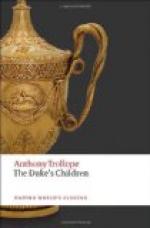Nothing had been gained, and poor Lady Mary was compelled to write a few lines which were to her most painful in writing.
’My dear Mrs Finn, ’I have seen papa, and he thinks that you ought to have told him when I told you. It occurs to me that it would have been a cruel thing to do, and most unfair to Mr Tregear, who was quite willing to go to papa, and had only put off doing so because of poor mamma’s death. As I had told mamma, of course it was right that he should tell papa. Then I told you, because you were so kind to me! I am so sorry that I have got you into this trouble; but what can I do?
’I told him I must write to you. I suppose it is better that I should, although what I have to say is so unpleasant. I hope it will all blow over in time, because I love you dearly. You may be quite sure of one thing,—that I shall never change.’ (In this assurance the writer was alluding not to her friendship for her friend but her love for her lover,—and so the friend understood her) I hope things will be settled some day, and then we may be able to meet.
’Your very affectionate
Friend,
‘Mary
Palliser’
Mrs Finn, when she received this, was alone in her house in Park Lane. Her husband was down in the North of England. On this subject she had not spoken to him, fearing that he would feel himself bound to take some steps to support his wife under the treatment she had received. Even though she must quarrel with the Duke, she was most anxious that her husband should not be compelled to do so. Their connection had been political rather than personal. There were many reasons why there should be no open cause of disruption between them. But her husband was hot-headed, and, were al this to be told to him and that letter shown to him which the Duke had written, there would be words between him and the Duke which would probably make impossible any further connection between them.
It troubled her very much. She was by no means not alive to the honour of the Duke’s friendship. Throughout her intimacy with the Duchess she had abstained from pressing herself on him, not because she had been indifferent about him, but that she had perceived that she might make her way with him better by standing aloof than by thrusting herself forward. And she had known that she had been successful. She could tell herself with pride that her conduct towards him had been always such as would become a lady of high spirit and fine feeling. She knew that she had deserved well of him, that in all her intercourse with him, with his uncle, and with his wife, she had given much and had taken little. She was the last woman in the world to let a word on such a matter pass her lips; but not the less was she conscious of her merit towards him. And she had been led to act as she had done by sincere admiration for the man. In all their political troubles, she had understood him better than the Duchess had done. Looking on from a distance she had understood the man’s character as it had come to her both from his wife and from her own husband.




